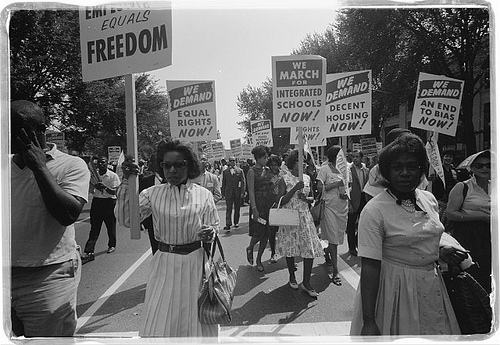Back in my days of Green Party organizing in the early nineties, I was the only activist in my nuclear family.
Now every member is trumpeting some cause or the other.
My mom and sister post Tea Party material, my brother’s family just went to the big climate march, and my dad spams friends and family on the greatness of Israel.
Sometimes it seems that everyone these days has some political cause for which they are working.
Almost all activism could be narrowed down to the act of bringing to light things that have been covered up. Not all political work is activist, but all activist work is in a way political, and often of the most frustrating variety. The activist struggles against the odds to bring things to light. She raises not only issues of suffering but of injustices and injustices that are often covered over by lies.
Bringing to light the shadow issues of any group tends to be a difficult and thankless task. Activists have to work hard to bring these things to light, because they are often covered up by people who do not want their deeds to be known.
But many of the truths activists seek to expose are simply difficult to face. No one wants to hear how global warming will wipe out a significant portion of the world’s species, after all.
This makes the activists a bit like “the skull grinning in at the party,” of which William James writes. Death and suffering is always present in life; activists simply expose it. But it is not just death and suffering they expose; activists often reveal injustices to which we all are a party. And to make us look, they will sometimes shake us by the shoulders.
Paul Ehrlich, author of the notorious 1968 classic, The Population Bomb, told me in an interview for my upcoming book on climate change that he and his wife had written numerous positive books on the need to transform our mindsets. But his more negative Population Bomb sold 50 times all of their more positive books combined.
Fear sells and activists know it. So, to get us to listen they will often bomb us with negativity.
Few of us really know what to do with our own mortality. Since so much of what we do in life is an escape from death, facing it can be terrifying and paralyzing. To throw it in our faces through graphic images on Facebook can be stunning. But activists will also often press us to face our own roles in the great saga of human suffering. And this can push us into denial and reactivity.
Each of us contributes to the suffering of others in countless ways of which we are unaware. One woman complains of global warming as she chews into the flesh of a factory farmed cow. Still another works to end hunger as his own children starve for affection.
Each of us does these sorts of things because there is so much suffering in the world of which we cannot keep track.
But activists tend to fixate.
Plato writes of a man who tries to avoid looking at a corpse, and after having done his best to avoid it finally forces himself to look and cannot turn away. The suffering to which activists seek to expose us can be mesmerizing. My friends who are working to end the occupation of Palestine, for instance, often do not post any photos of themselves but only those of dead children.
The willingness to lose oneself in such a cause is noble and praiseworthy. But it is like walking through an emotional minefield.
Few can gaze into the face of death for long. So, activists tend to develop their own coping mechanisms. One of the easiest ways to get a grip on life in the face of so much death is to ignore everything except for one or a few issues. We fixate on the rainforests because we do not want to face the hungry children, running from one death into the arms of another.
Or else we blame the problem on some powerful group of individuals, when really we are all responsible.
There is a tendency among activists to simplify to the point of absurdity. They craft conspiracies, cast blame on a single powerful group, ignore the power of mass social inertia. But the world is highly complex, and to pretend otherwise is to play games with suffering and injustice.
All of this can be frustrating to watch, but the work of activists is hard and it is important. We need to honor it, for it may be the last best hope for democracy. But we also need to give activists a lifeline.
For activists need the space to examine how their work is affecting them emotionally.
Social media has made us in many ways a society of part-time activists. We need to ask what revealing so many shadow issues simultaneously has on political culture itself. Perhaps any given social system can only take so much activism before it begins to degenerate. The shadow issues need to be processed and the solutions integrated.
And if this is the case, we had better choose our causes well and not waste our messages on trivialities and reactivity.
Love elephant and want to go steady?
Sign up for our (curated) daily and weekly newsletters!
Editor: Renée Picard
Photo: elephant archives







Read 1 comment and reply